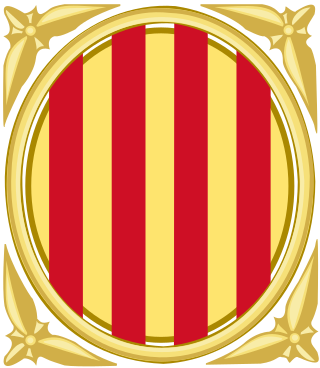
Catalonia is an autonomous community of Spain, designated as a nationality by its Statute of Autonomy. Most of its territory lies on the northeast of the Iberian Peninsula, to the south of the Pyrenees mountain range. Catalonia is administratively divided into four provinces or eight vegueries (regions), which are in turn divided into 42 comarques. The capital and largest city, Barcelona, is the second-most populous municipality in Spain and the fifth-most populous urban area in the European Union.
Generalitat is the name of two major medieval and early modern political institutions and their modern-day analogues in Kingdom of Spain. The ancient Principality of Catalonia and the Kingdom of Valencia were ruled by Generalitats. Today, Catalonia and The Valencian Community have systems of self-government called Generalitats, and are two of 17 autonomous communities of Spain. The term is also used for the government of the semi-autonomous comarca of Val d'Aran, the Generalitat a l'Aran.

The comarques of Catalonia, often referred to in English as counties, are an administrative division of Catalonia. Each comarca comprises a number of municipalities, roughly equivalent to a county in the United States. Currently, Catalonia is divided into 42 comarques and Aran, considered a "unique territorial entity" and not a comarca.

"Els Segadors" is the official national anthem of Catalonia, nationality and autonomous community of Spain.
The Generalitat de Catalunya, or the Government of Catalonia, is the institutional system by which Catalonia is self-governed as an autonomous community of Spain. It is made up of the Parliament of Catalonia, the President of the Government of Catalonia, and the Executive Council of Catalonia. Its current powers are set out in the Statute of Autonomy of Catalonia of 2006.

Josep Bargalló i Valls is a Spanish teacher and politician from Catalonia and the current Minister of Education of Catalonia.

The Executive Council of Catalonia or the Executive Government of Catalonia is the executive branch of the Generalitat of Catalonia. It is responsible for the political action, regulation, and administration of the government of the autonomous region.

The fourth government of Jordi Pujol was formed on 16 April 1992 following the latter's reelection as President of Catalonia by the Parliament of Catalonia on 9 April and his swearing-in on 15 April, as a result of the Convergence and Union (CiU) alliance emerging as the largest parliamentary force at the 1992 Catalan regional election and securing a third consecutive absolute majority. It succeeded the third Pujol government and was the Government of Catalonia from 16 April 1992 to 11 January 1996, a total of 1,365 days, or 3 years, 8 months and 26 days.

The Palace of the Generalitat of Catalonia is a historic palace in Barcelona, Catalonia, Spain. It houses the offices of the Presidency of the Generalitat de Catalunya. It is one of the few buildings of medieval origin in Europe that still functions as a seat of government and houses the institution that originally built it.

The president of the Government of Catalonia is head of government of Catalonia, leading the executive branch of the Generalitat de Catalunya, the Catalan government.

The Library of Catalonia is the Catalan national library, located in Barcelona, Catalonia, Spain. The primary mission of the Library of Catalonia is to collect, preserve, and spread Catalan bibliographic production and that related to the Catalan linguistic area, to look after its conservation, and to spread its bibliographic heritage while maintaining the status of a center for research and consultation.

The Creu de Sant Jordi is one of the highest civil distinctions awarded in Catalonia (Spain), surpassed only in protocol by the Gold Medal of the Generalitat de Catalunya. It was established by the Generalitat de Catalunya autonomous government by virtue of the Decret 457/1981 de 18 de desembre in 1981. The medal was designed by goldsmith Joaquim Capdevila.

The following outline is provided as an overview of and topical guide to Catalonia:

Rodalies de Catalunya is the main commuter and regional rail system in the Spanish autonomous community of Catalonia. It is administered by the Government of Catalonia and operated by the national rail operator Renfe Operadora. The system consists of 17 service lines chiefly centred in the Barcelona area, serving a total of 203 stations throughout Catalonia, with an average number of 1,000 trains running on it every day. In 2016, it had an annual ridership of 117 million.

The Catalan Republic was a state proclaimed in 1931 by Francesc Macià as the "Catalan Republic within the Iberian Federation", in the context of the proclamation of the Second Spanish Republic. It was proclaimed on 14 April 1931, and superseded three days later, on 17 April, by the Generalitat de Catalunya, the Catalan institution of self-government within the Spanish Republic.

Pere Aragonès i Garcia is a Catalan lawyer and politician, and the President of the Government of Catalonia from 2021 to 2024. He previously served between 2018 and 2021 as Vice President and Minister of Economy and Finance of Catalonia, as well as Acting President since 28 September 2020. He is a member of the Republican Left of Catalonia (ERC) political party.

The coat of arms of Barcelona is the official emblem of the City Council of Barcelona, the capital of Catalonia, has its origin in the Middle Ages, these arms were first documented in 1329. The Government of Catalonia conferred the coat of arms and the flag as official symbols of the municipality in 2004. It has an escutcheon in lozenge which is commonly used in municipal coats of arms of cities in Catalonia. Currently the City Council of Barcelona also uses an isotype based on the heraldry of the city.
The Department of Justice of the Government of Catalonia is the Ministry of Justice part of the Executive Council of Catalonia, administering the justice system of the Catalonian self-government, the Generalitat de Catalunya.














